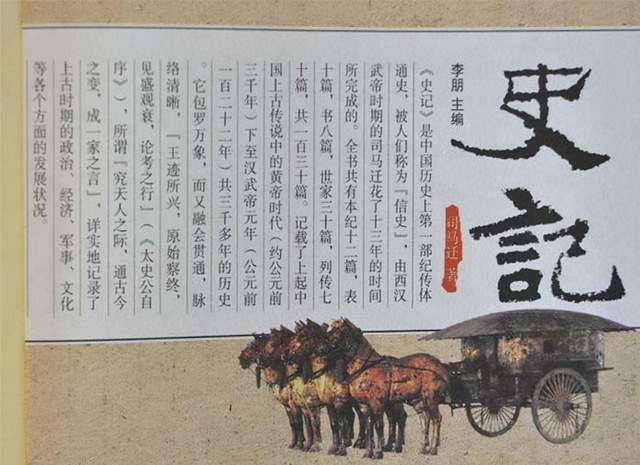Mr. Lu Xun once commented on the "History of History": "The historian's absolute singing, the rhymeless detachment", which directly explains its supreme status in the field of Chinese historiography. However, why was such a work, which has only been written in thousands of years, born in the Han Dynasty?

This has to be said from the background of the birth of the "History". From the perspective of literary segmentation, the Qin Dynasty and the Han Dynasty are collectively referred to as the Qin and Han Dynasties, and the Han Dynasty is the second great unified dynasty in China, before qin shi huang unified China, ending the chaotic situation of the wars between the princes during the Three Kingdoms period. In such a grand political background, even Chinese literature has been influenced by the political background of great unification and has entered a new stage.
However, when the Qin Dynasty was just established, the establishment of a unified centralized state brought not vitality to literature, but an extreme cultural autocratic policy, and under the heavy canon, literary creation was unprecedentedly snubbed. Not only were there no outstanding writers, but there were only a few literary works that had survived, but the few remaining works and some works of similar times reflected the political trends of the time.
For example, the "Spring and Autumn of the Lü Dynasty", compiled by Lü Buwei's disciples, was written in 239 BC, which is a complete system, widely absorbs the views of the hundreds of sons and hundreds of families, and objectively reflects the historical trend of the country's imminent unification in the last years of the Warring States period. The only literati left behind in the Qin Dynasty was Li Si, whose "Book of Expulsion" was laid out in comparison, vertical and horizontal discussion, strong logic, and rich in literary style. Most of the carved stone inscriptions that record qin shi huang's parade and fengchan are also from Li Si's hand, in addition to the famous "Langyatai" inscriptions, they are all three sentences and one rhyme, which are solid and majestic, and have an important impact on the inscriptions of later generations.
However, in the Han Dynasty, it was not just a great unification of politics and territory. After Emperor Wu of the Han Dynasty deposed hundreds of families and exalted Confucianism alone, Confucianism became an officially supported discipline, and since then the han Dynasty's governance and writings have been influenced by Confucianism. At that time, what people were pursuing was a kind of value orientation and the ideal of the holy lord and sage through the way of writing books and making speeches, as well as the great unification of the Han Dynasty and the economic prosperity, the writers of the entire Han Dynasty were full of heroic feelings, reflected in literature, that is, everything in the ancient and modern worlds and the heavens and the world must be placed under their own ideas, such as Sima Xiangru said that "the heart of the family, including the universe, the general characters", Sima Qian said, "On the occasion of the investigation of heaven and man, the changes through ancient and modern times, into the head of a family", so "History" The creation of this work is also an important embodiment of this idea.
At the same time, behind emperor Wudi of the Han Dynasty's deposing of the Hundred Schools of Confucianism, it also represented that the ideological circles shifted from criticism of history to attention to reality, and the praise of merit and criticism of reality became the main mission of Han Dynasty literature. Therefore, from Jia Yi's political theory to Sima Xiangru's "Theory of Lamentation II", as well as Sima Qian's "History", the spirit of criticism of history runs through the whole, for example, Sima Qian praised Huo's outstanding military merits and used the god of soldiers, but also showed his extravagance in the biographies of others, which is the embodiment of a reflective thought.
Coupled with the fact that the Han Dynasty was founded to overthrow the tyranny of the Qin Dynasty, a general trend of the Han Dynasty was to sum up the lessons of the rapid demise of the Qin Dynasty and reflect on history from a lofty height, which was an important part of the literature of the early Han Dynasty; and the status of the literati in the Han Dynasty underwent an evolutionary process from independence to dependence to independence. Therefore, Sima Qian's "Records of History" can restore history in a certain sense and publish the true thoughts of historians, not only carrying forward the greatness of Emperor Wu of Han, but also satirizing his good martial arts and exhausting his military skills.
In short, the literati of the early Han Dynasty had their own independent personality and free characteristics, did not depend on the Son of Heaven, and strived to engage in creation according to their own ideals, and their criticism of history and reality was greatly enhanced in depth, breadth, and intensity. Therefore, Sima Qian's "Records of History" can be formed on this basis, which can not only praise the emperor and the princes and nobles, but also criticize reality from the side and take history as a mirror.